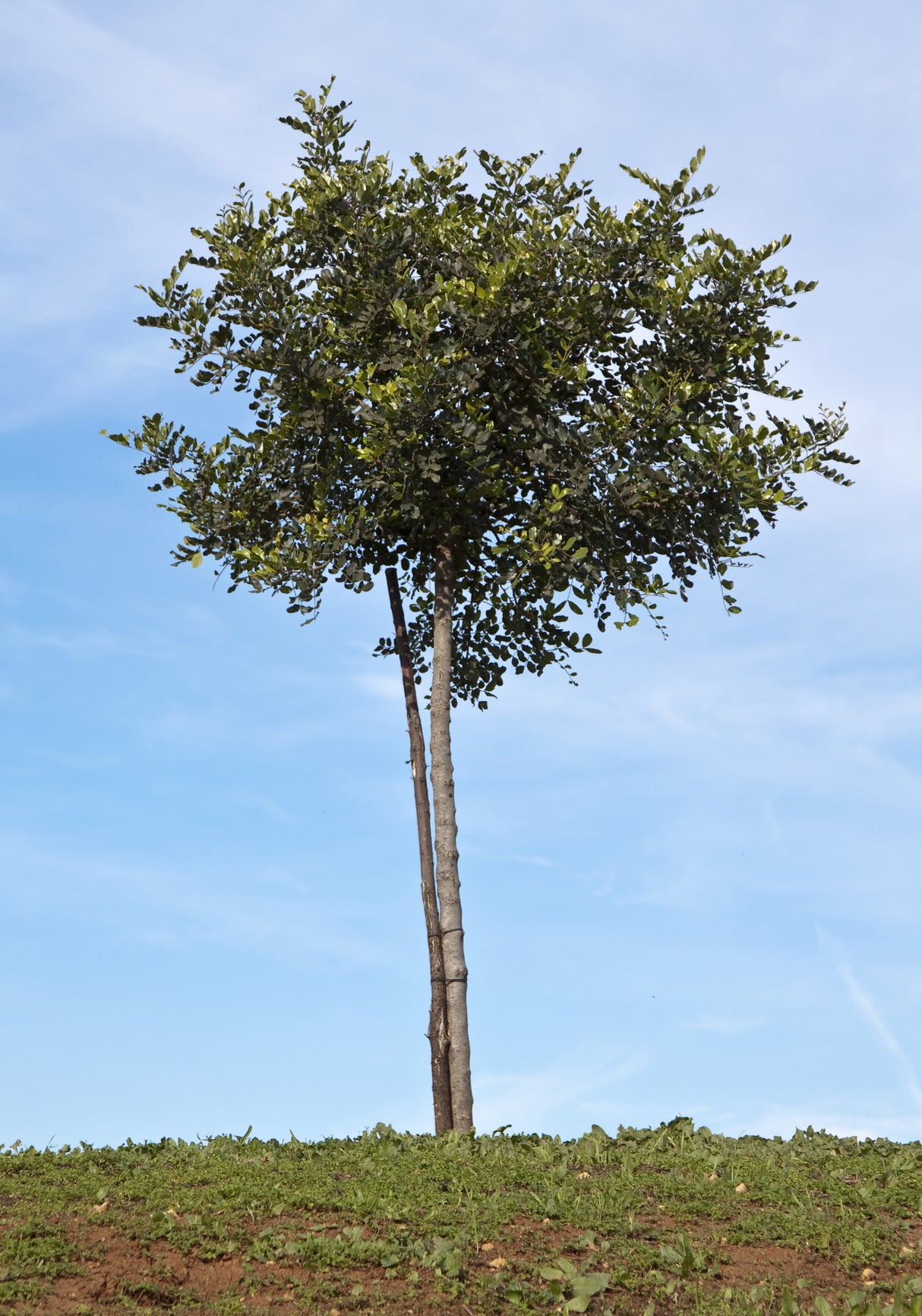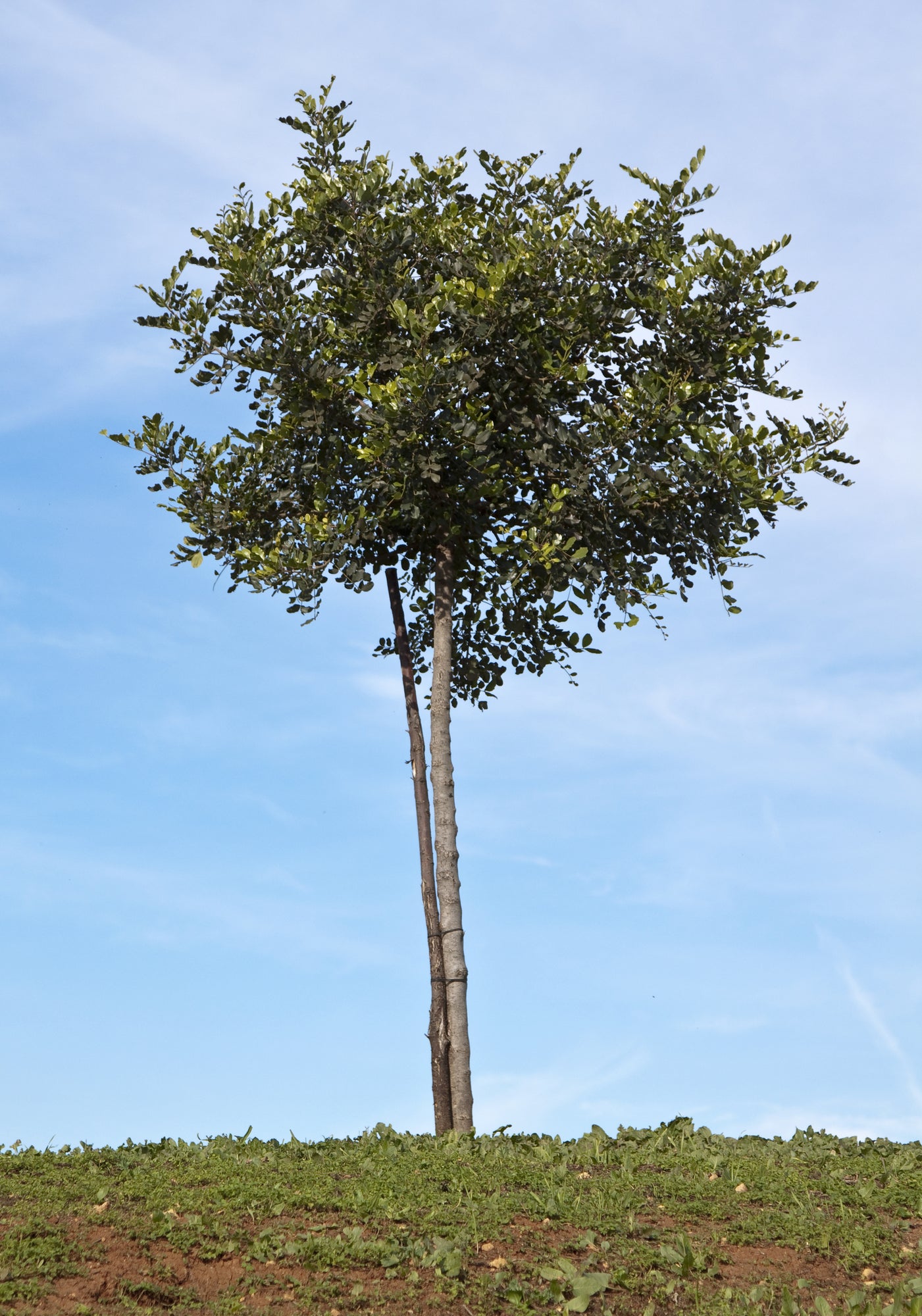Description
Description
The Ceratonia siliqua, or Carob Tree, is a hardy, evergreen tree native to the Mediterranean, renowned for its sweet, edible pods and tolerance to arid climates. Growing up to 10–12 meters tall, it features a broad, rounded canopy with leathery, dark green leaves. The tree produces small, inconspicuous red flowers, followed by long, brown pods that are processed into carob, a chocolate substitute.
Low-maintenance and drought-tolerant, the Carob Tree is ideal for orchards, ornamental planting, and erosion control in arid and semi-arid landscapes.
Specifications:
- Height: 10–12 meters
- Width: 10–12 meters
- Native to: Mediterranean region
- Foliage: Leathery, dark green, pinnate leaves; evergreen
- Growth rate: Slow to moderate
Conditions:
- Soil: Prefers well-drained, sandy or rocky soils; tolerates poor and alkaline soils
- Light: Full sun
- Water: Very low; highly drought-tolerant once established
- Climate: Thrives in Mediterranean, subtropical, and semi-arid regions
Additional Features:
- Flowers: Small, red, and fragrant; dioecious (male and female flowers on separate trees)
- Fruit: Long, sweet, brown pods rich in sugars and used in culinary and animal feed applications
- Uses: Ideal for orchards, shade, erosion control, and ornamental planting in arid landscapes
- Spacing: Plant 8–10 meters apart for orchard planting or standalone growth
- Low Maintenance: Requires minimal care; prune to shape or remove deadwood
- Pest Resistance: Naturally pest-resistant and adaptable to tough conditions
- Environmental Benefits: Stabilizes soil, prevents erosion, and provides habitat for wildlife
- Economic Value: Pods are a source of carob powder, syrup, and locust bean gum
- Cultural Significance: Historically valued for its pods and used in trade and traditional medicine
The Carob Tree is a resilient and versatile species, perfect for enhancing arid landscapes, supporting sustainable agriculture, and providing ornamental and functional value.
Delivery Information
Delivery Information
We offer flexible delivery options to ensure your tree arrives in perfect condition, whether you're located nearby or on the other side of the world.
- Domestic Deliveries:
We provide reliable delivery services across the country, utilizing our fleet of specialized trucks and train freight networks. Whether you're in a metropolitan area or a remote location, we ensure your trees arrive safely and efficiently. - International Deliveries:
For our global customers, we coordinate delivery via sea freight. With 30+ years of exporting experience, every tree is carefully prepared to meet international biosecurity standards and packaged for safe transport to its destination.
Our team will work closely with you to arrange the most suitable delivery method based on your location, project timeline, and tree size. No matter where you are, we ensure a seamless delivery experience.
Have additional questions? Contact us to discuss your specific delivery requirements!
FAQ's
FAQ's
How are ex-ground trees prepared for delivery?
All ex-ground trees are carefully dug with their rootball intact to preserve the root system and minimize transplant shock. Each tree is stabilized and treated with specialized solutions to promote health during transit. The rootball is wrapped to retain moisture and protect it from damage, and water crystals are added to provide essential nutrients and hydration for the journey. These meticulous preparations ensure your tree remains healthy and ready for planting, whether it’s traveling across the country or overseas.
How long does delivery take?
Delivery times vary depending on your location and the size of your order. Domestic deliveries typically take 1–2 weeks, while international shipping may take several weeks depending on the destination. Contact us for specific timelines.
Are there minimum order quantities for delivery?
For local and nationwide orders, there are no strict minimums, though delivery costs may vary based on order size. For international orders, a minimum quantity is often required to optimize freight efficiency. Contact us to discuss your needs.
Do you provide installation services?
While we focus on the supply and delivery of trees, we can connect you with trusted landscaping partners who specialize in tree installation and site preparation.
Can I visit your farms to select trees?
Yes, we welcome visits to our farms by appointment. Seeing the trees in person allows you to select the perfect specimens for your project. Contact us to schedule a visit.



 Inspection available upon request
Inspection available upon request
 Photos are of example stock
Photos are of example stock
 International Delivery Available
International Delivery Available
 Available For Export
Available For Export
